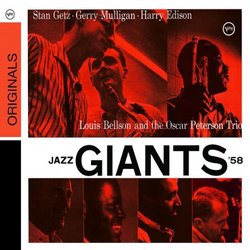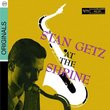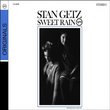| All Artists: Stan Getz, Oscar Peterson Title: Jazz Giants 58 Members Wishing: 1 Total Copies: 0 Label: Verve Original Release Date: 1/1/2008 Re-Release Date: 3/18/2008 Album Type: Original recording remastered Genres: Jazz, Pop Styles: Cool Jazz, Modern Postbebop, Bebop Number of Discs: 1 SwapaCD Credits: 1 UPC: 602517621329 |
Search - Stan Getz, Oscar Peterson :: Jazz Giants 58
CD DetailsSimilar CDs
|
CD Reviews"Chocolate Sunday": Timeless '50s Treat with a Lasting Flavo Samuel Chell | Kenosha,, WI United States | 03/22/2008 (5 out of 5 stars) "What a surprise to find this session reissued, and domestically at that. Gerry, Sweets, Oscar, Bellson--these are some of the most identifiable, inimitable and personal instrumental voices in American music, and each of the musicians speaks with sufficient authority to be considered "leader" on the date. But it is Getz who makes the most lasting impression. Stan Getz--a player whose facility and pyrotechnics are perhaps equalled by no other tenor saxophonist (listen to "For Musicians Only," his date with Diz and Stitt) and whose melodic-harmonic sensibilities, as demonstrated on an album such as Eddie Sauter's "Focus," are still beyond the reach of most musicians. Yet on this occasion he offers up some of the most laconic, minimalist playing on record--not the effete, whispering and somewhat wimpy and meandering solos of his early West Coast "cool" jazz period but music that's as deeply embedded in the blues as Lady Day and Lester performing "Fine and Mellow." On "Chocolate Sunday," a medium-tempo blues in G introduced by a remarkable Ray Brown bass solo (no artificial boosts or electronic pick-up), Getz follows Oscar Peterson's thunder by practically eschewing technique altogether in favor of pure emotional expression. It's an instance of brilliant restraint resulting in playing of unrestrained feeling. Each sound is articulated differently--from above the pitch or just under it--and the notes are more often sustained than clustered into glib phrases. It's as basic and fundamental as the music can get, an honest cry from the heart--elemental yet penetrating lyric poetry. Of the many Getz recordings I've collected, this is the one I'd be most reluctant to part with." No Stream like Mainstream Nikica Gilic | Zagreb, Croatia | 04/08/2008 (5 out of 5 stars) "Yes, this is a beautiful and logical aglomeration of jazz giants: those who are the giants of modern jazz (Mulligan, Getz) have deep roots in the jazz tradition; it is actually quite fascinating to hear Stan Getz on the opening number: he actually adds some of Lester Young style wailing to his cool tenor sound! That's quite compatible with the general mood of the song, with Harry "Sweets" Edison, in his prime, and really swinging rhythm section, consisting of Oscar Peterson's trio (with great Ray Brown having some opportunities to solo on this album and Herb Ellis doing some very effective comping), plus great Louis Bellson on the drums... The basic principle of this album leans towards swing rather than modern jazz, but modern jazz is a key ingredient to this brilliant mainstream affair; it is a genuine pleasure to listen to Harry Edison working on Dizzy Gilespie's standard "Woody'n'you"... All the musicians involved really shine (and both Mulligan and Getz have previously proven how well they work with older musicians - Hamp, the Prez, Roy Eldridge...) so this is a mainstream jazz affair to remember, a true festival of jazz giants, with Mulligan, in addition to sensitive solos, contributing some head on arrangements..." Mulligan/Getz/Edison and Peterson Trio Jam rash67 | USA | 12/10/2008 (4 out of 5 stars) "It's been a number of years since I heard a new Stan Getz recording worth mentioning. Since the release of "Bossas and Ballads". Most of what comes out these days are "best of's" or re-packagings.
On this CD we have a jam session, organized by Norm Granz, of a number of artists who bridge the swing and be-bop era and have their feet planted firmly in both. So the music is happy or sad, but played with much feeling, spirited and it always swings! It's in high rotation and I return to it often, so I'd consider it one of the best of the newer Getz albums. The "head arrangements" were written by Jerry Mulligan, so the "jam" session is much better organized than most. Mulligan did some wonderful larger group arranging in the '50's and then enentually stopped and went on to standard bebop solo with backup group. The others, Getz, Sweets Edison, Oscar Peterson, Ray Brown, take turns doing their parts. On "When Your Lover has Gone" Getz comes in faintly behind Edison's solo, so faint you can hardly hear it. Sometimes Mulligan plays up high on his baritone, Getz plays low on his tenor - it is only the sweetness of tone which tells them apart. Edison, with his Harmon mute, creates that mosquito tone reminiscent of Miles Davis in this period. This is not a solo Getz album with the others backing him (if that's what you are looking for), each player really get all the time to stretch out he wants and the others back him up. However, Getz, when he plays, soars over the whole crowd like a big eagle. Everyone here plays well and seems to have a great time doing it. "Chocolate Sundae" starts with a swinging bass groove and Medley ("Ballade") gives the principles a chance to play sweet. Many albums from this period are poorly recorded, this one, I'm pleased to announce, is well recorded. This is better recorded, for example, than the Granz/Verve Getz with Mulligan and Getz with Peterson albums, are also great performances, but a but murky." |



